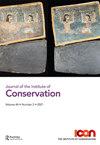利用铒激光器解决保护挑战:大英博物馆的案例研究
IF 1
0 HUMANITIES, MULTIDISCIPLINARY
引用次数: 5
摘要
在大英博物馆进行了一项研究,以调查Er:YAG激光器在解决传统保护方法失败的具有挑战性的保护问题方面的潜力。接下来的方法是对模型样品和未注册物体进行激光测试,以确定每个基材上的激光改变阈值影响以及激光去除污染物(如无机结皮和有机涂层)的能力。通过光学显微镜、扫描电镜和颜色测量来评估激光的效果。如果对样品和未注册物体的测试成功,激光就会被用于大英博物馆收藏的文物。本文详细介绍了使用Er:YAG激光去除金属腐蚀、陶瓷和贝壳上旧粘合剂残留物、多色石灰石和陶土的模具、壁画上的现代覆漆和清漆的成功结果。本文章由计算机程序翻译,如有差异,请以英文原文为准。
Tackling conservation challenges using erbium lasers: case studies at the British Museum
Abstract Research was conducted at the British Museum to investigate the potential of Er:YAG lasers to address challenging conservation problems where traditional conservation methods had failed. The approach followed was to perform laser tests on model samples and unregistered objects to determine the laser alteration threshold fluence on each substrate and the ability of the laser to remove contaminants, such as inorganic crusts and organic coatings. The effects of the laser were assessed by means of optical microscopy, scanning electron microscopy and colour measurements. If tests were successful on the samples and unregistered objects, the laser was then used on artefacts from the collection of the British Museum. This article details the successful results obtained using Er:YAG lasers for the removal of corrosion from metals, remains of old adhesives from ceramics and shells, mould from polychromed limestone and terracotta, modern overpainting and varnish from a fresco painting.
求助全文
通过发布文献求助,成功后即可免费获取论文全文。
去求助
来源期刊

Journal of the Institute of Conservation
HUMANITIES, MULTIDISCIPLINARY-
CiteScore
1.50
自引率
0.00%
发文量
22
期刊介绍:
The Journal of the Institute of Conservation is the peer reviewed publication of the Institute of Conservation (Icon). As such, its aims reflect those of Icon, to advance knowledge and education in conservation and achieve the long term preservation and conservation of moveable and immoveable cultural heritage. The Journal provides a collective identity for conservators; it promotes and supports both the profession and professionalism. With international contributions on all aspects of conservation, it is an invaluable resource for the heritage sector. The specific aims of the Journal are to: 1. promote research, knowledge and understanding of cultural heritage conservation through its history, practice and theory 2. provide an international forum to enable and disseminate advances in research, knowledge and understanding relating to conservation and heritage 3. champion and support professional standards of heritage conservation in the UK and internationally 4. provide a permanent record of issues relating to conservation and heritage 5. be financially and operationally sustainable. To achieve these aims, the Journal invites contributions from all those involved in the conservation of cultural heritage and related activities. Areas of interest include understanding cultural heritage materials and their degradation; subject reviews and histories of cultural heritage materials and conservation treatments; new, innovative or improved approaches to conservation and collections care theory, practice, communication, management and training; case studies demonstrating new, innovative or improved approaches; and conservation in its wider context. Submitters are encouraged to demonstrate how their work is of practical application to conservation. To maintain professional standards and promote academic rigour, submissions of articles and shorter notices are subject to an anonymous peer review process.
 求助内容:
求助内容: 应助结果提醒方式:
应助结果提醒方式:


